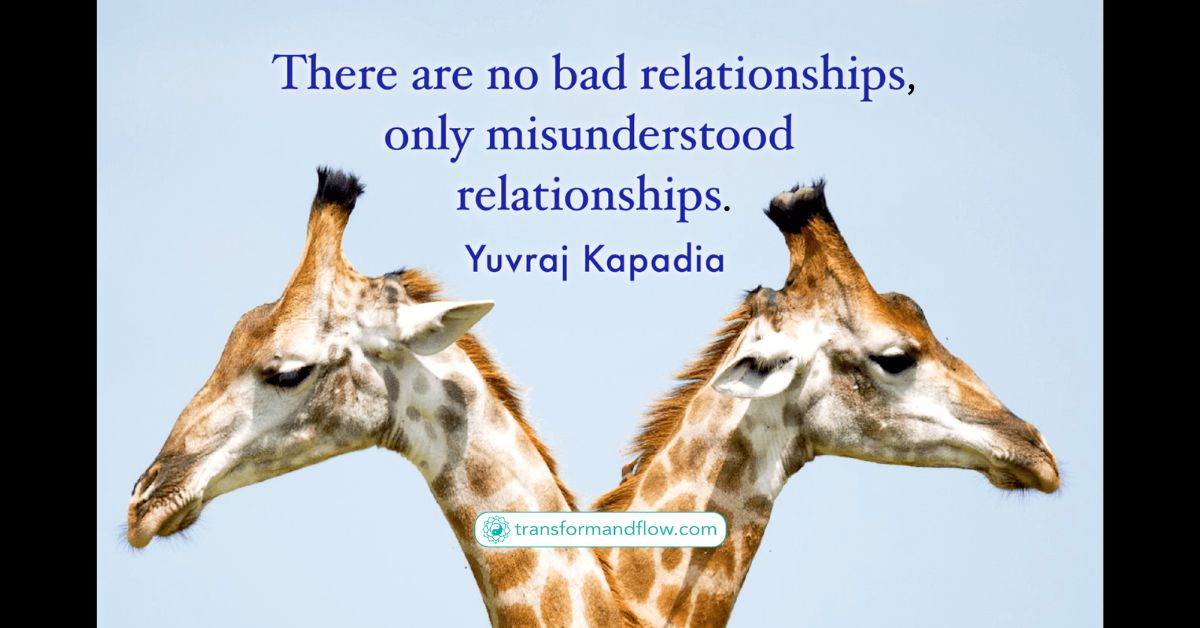Yuvraj Kapadia’s assertion,
There are no bad relationships, only misunderstood relationships
challenges the conventional narrative of relationship failure. It invites us to look beyond simplistic labels of “good” or “bad” and instead, delve into the intricate dance of communication, perception, and expectation that shapes our connections. This quote isn’t about excusing harmful behavior, but rather, about advocating for a deeper understanding of the complexities that often lead to relational discord.
Relationships, in their essence, are a tapestry woven from individual experiences, beliefs, and communication styles. When these threads clash, misunderstandings arise, creating friction and pain. Instead of resorting to blame or dismissal, Kapadia encourages us to approach these conflicts with curiosity and a willingness to explore the underlying dynamics.
The Landscape of Misunderstanding
Misunderstandings can manifest in countless ways, often stemming from:
- Differing Communication Styles: One person might be direct and assertive, while the other is indirect and passive. This mismatch can lead to feelings of being unheard or disregarded.
- Unmet Expectations: We often enter relationships with unspoken expectations about how others “should” behave. When these expectations are not met, resentment and disappointment can fester.
- Past Experiences: Past relationships and experiences shape our current perceptions and behaviors. Unresolved trauma or negative patterns can color our interactions, leading to misinterpretations.
- Lack of Empathy: The inability to understand and share another person’s feelings can create a chasm of disconnection.
- Assumptions: We make many assumptions about what other people think or feel, often without verifying them.
Moving Beyond Blame: A Path to Understanding
Instead of labeling a relationship as “bad,” we can adopt a more constructive approach:
- Cultivate Empathy: Try to understand the other person’s perspective, even if you don’t agree with it. Ask open-ended questions and listen actively.
- Communicate Effectively: Express your needs and feelings clearly and respectfully. Avoid accusatory language and focus on “I” statements.
- Identify Underlying Patterns: Reflect on the recurring conflicts in the relationship. What are the triggers? What are the underlying needs that are not being met?
- Seek Clarity: Don’t assume you know what the other person is thinking or feeling. Ask for clarification and be willing to admit your own misunderstandings.
- Set Boundaries: Understanding doesn’t equal accepting unacceptable behavior. Setting healthy boundaries is essential for protecting your well-being.
- Seek Professional Guidance: A therapist or counselor can provide valuable insights and tools for navigating complex relationship dynamics.
The Power of Perspective
Often, what we perceive as “bad” behavior is simply a manifestation of unmet needs or unresolved pain. By shifting our perspective, we can move from judgment to compassion.
Consider this hypothetical scenario:
Sarah feels constantly criticized by her partner, Mark. She labels him as “controlling” and “negative.” However, through therapy, they discover that Mark’s critical behavior stems from a deep-seated fear of abandonment, rooted in his childhood experiences. He uses criticism as a way to maintain control and prevent being hurt.
Once Sarah understands the underlying cause of Mark’s behavior, she can approach the situation with more empathy. They work together to develop healthier communication patterns and address Mark’s fear of abandonment.
As Mark starts feeling less affected by Sarah seeing him as “controlling” or “negative,” he can naturally let go of those old habits. And as Sarah becomes more aware of herself and the dynamic, one of two things tends to happen: either Mark changes and the relationship improves, or he doesn’t, but it just doesn’t bother her like it used to. Either way, everything starts to feel different
In this scenario, labeling the relationship as “bad” would have prevented them from exploring the deeper issues and finding a path to healing.
Agreeing to Disagree: A Powerful Act of Mutual Respect
It acknowledges that every person views the world through a unique lens shaped by their upbringing, culture, values, and personal experiences. What one person sees as truth may seem entirely foreign to another, not because one is right and the other is wrong, but because their life paths have been fundamentally different.
When we allow space for this diversity of thought without the need to win or convince, we foster understanding, even in disagreement.
It’s important to remember that we rarely, if ever, know the full story behind someone’s beliefs or reactions. Past traumas, triumphs, and turning points all quietly inform how someone sees and responds to life. By accepting this, we not only honor the complexity of human experience but also create space for deeper, more compassionate dialogue.
Sometimes, the healthiest resolution isn’t agreement – it’s choosing peace over the need to be right.
The Importance of Self-Reflection
Understanding our relationships also requires self-reflection. We must examine our own patterns, beliefs, and behaviors that contribute to misunderstandings.
- Are we projecting our past experiences onto our current relationships?
- Are we communicating our needs effectively?
- Are we willing to listen and empathize with the other person?
By taking responsibility for our own role in the relationship dynamic, we can create space for growth and understanding.
Beyond the Label
Kapadia’s quote is not about condoning toxic relationships. It’s about encouraging us to move beyond simplistic labels and embrace the complexity of human connection. It’s about recognizing that relationships are not static entities but dynamic processes that require ongoing effort, understanding, and compassion.
By shifting our perspective from judgment to curiosity, we can transform “bad” relationships into opportunities for growth, healing, and deeper connection.
Concluding Thoughts
The journey of understanding relationships is a continuous process of self-discovery and empathy. By embracing Kapadia’s wisdom, we can move beyond the limitations of simplistic labels and cultivate more meaningful and fulfilling connections. It requires courage, vulnerability, and a willingness to see beyond the surface. But the rewards – deeper understanding, stronger connections, and personal growth – are immeasurable.


